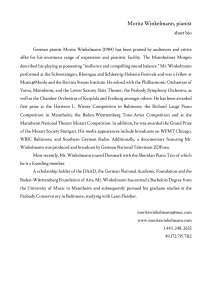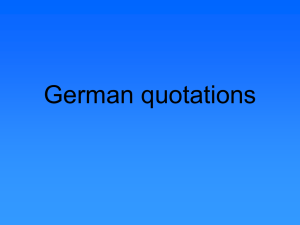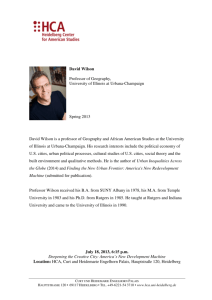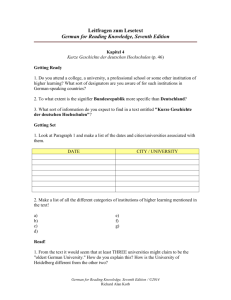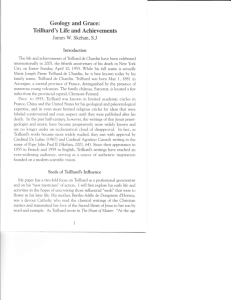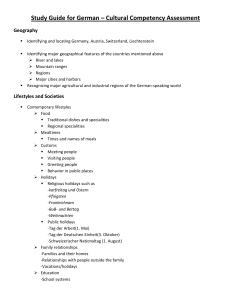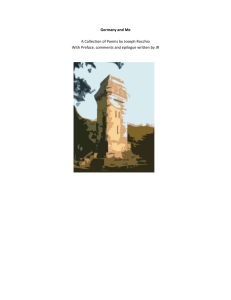Das Boot
advertisement
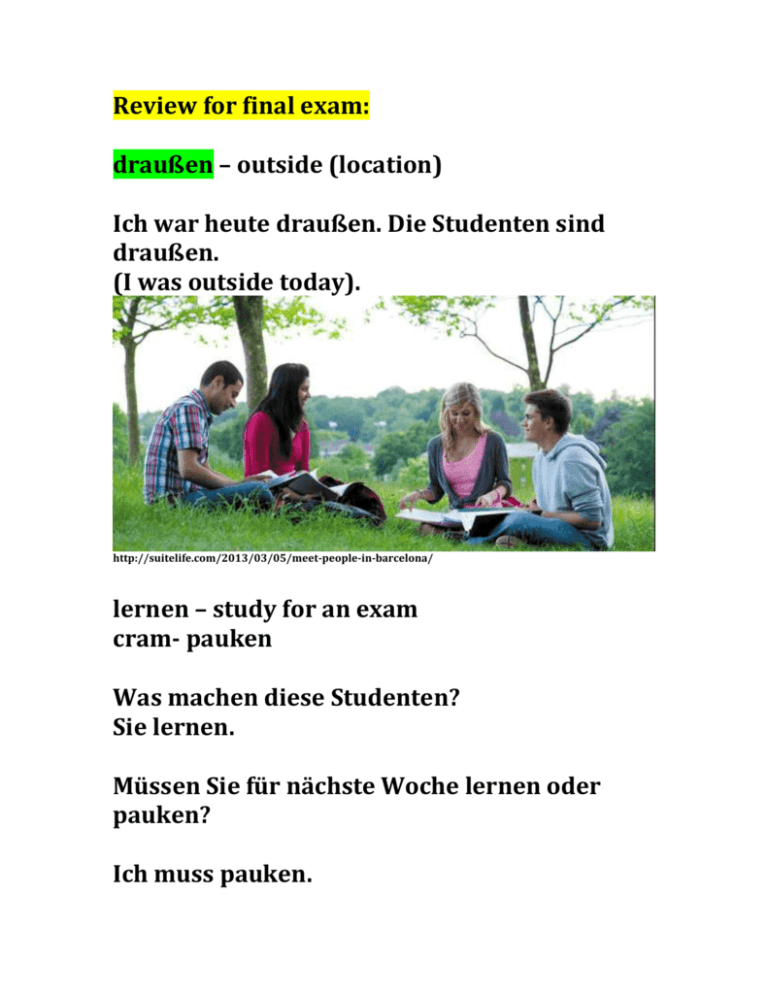
Review for final exam: draußen – outside (location) Ich war heute draußen. Die Studenten sind draußen. (I was outside today). http://suitelife.com/2013/03/05/meet-people-in-barcelona/ lernen – study for an exam cram- pauken Was machen diese Studenten? Sie lernen. Müssen Sie für nächste Woche lernen oder pauken? Ich muss pauken. Ich gehe hinaus. Past tense (Perfect tense: Past Participles) Ich bin zu meiner Großmutter gegangen. (PP) Auxiliary verb fahren >>>>> gefahren schwimmen geschwommen schimmen gehen : to go swimming Ich bin schwimmen gegangen. (Ich gehe schwimmen) aufstehen – get up Ich bin um sieben Uhr aufgestanden Wann sind Sie heute aufgewacht? Ich bin um 8 Uhr 30 (8.30 Uhr/halb neun) aufgewacht. aufwachen = waschen PP gewaschen Wohin sind Sie am Wochenende gegangen? curious = neugierig Was müssen Sie heute Nachmittag machen/tun? Ich muss nur ein bisschen lernen. Ich meine, ich muss viel pauken!!!!!!!!! Der Himmel ist heute blau. Mögen Sie das? Ja, ich mag das. Das Frühstück breakfast Frühstücken = to eat breakfast PP: gefrühstückt Was haben Sie heute gefrühstückt? Ich habe Brot gegessen und Kaffee getrunken. Bread (das) brot Was mussten Sie gestern tun? Ich musste arbeiten. Was haben Sie gearbeitet? prepare food = Essen zubereiten PP: zubereitet Ich musste Salat und Sandwiches zubereiten Was haben Sie bei Ihrer Großmutter gemacht? Ich habe mit einem Hund gespielt. Der Hund / ein Hund Ich habe mit meiner Großmutter ferngesehen. Was werden Sie im Sommer machen? Ich werde eine Klasse (einen Kurs) nehmen. Organische Chemie 2 Was würden Sie gerne im Sommer machen? (hypothetically speaking) Ich würde gerne nach Colorado fahren. (= I would like to drive to Colorado.) Subjunctive alternative for the strong verb fahren: Ich führe gerne nach Colorado. (= I would like to drive to Colorado.) Ich würde gerne jeden Tag 8 Stunden schlafen. Ich schliefe gerne jeden Tag 8 Stunden. Ich würde gerne oft schwimmen gehen. Subjunctive alternative: Ich ginge gerne oft schwimmen. Du gingest Wir gingen , sie gingen, Sie gingen Ihr (you all) ginget wollen – want to: Ich will 8 Stunden schlafen. Ich will nicht 8 Stunden schlafen. Ich will heute hinaus gehen. Das Wetter ist so schön!! go outside >> hinaus (destination) http://www.toledoblade.com/image/2007/10 /09/800x_b1_cCM_z/Toledo-area-heat-wavefalls-short-of-record-2.jpg Your new bumper sticker: Deutsch lernen macht Spaß!!!! (Learning German is fun!!!!) http://spletinka.blogspot.com/2012/11/deutsch-3-ubung-macht-den-meister-auch.html sich interessieren für + Accusative Interessieren Sie sich für die Geschichte Deutschlands? Ja, ich interessiere mich dafür Für welchen Teil? Den Zweiten Weltkrieg? Die Schoah? Die Berliner Mauer? Die DDR? Die Politik Deutschlands heute Die Kunst Deutschlands? Deutsche Rock- und Popmusik Peter Fox Das Haus am Ende der Stadt http://en.wikipedia.org/wiki/Peter_Fox_%28mus ician%29 Pierre Krajewski (born 3 September 1971), better known as Peter Fox, also known as Enuff and Pete Fox, is a German reggae and Hip hop musician from Berlin. He is also a member of the German reggae and dancehall band Seeed. Peter Fox started working on a solo album named Stadtaffe ("Urban Ape") in 2007. The album was released in Germany on the 26th of September 2008. All songs are in German. Monk and DJ Illvibe co-produced the album,[1] and the Deutsches Filmorchester Babelsberg, as well as the Cold Steel Drumline contributed to the music. Personal life Peter Fox played the horn in his youth. He lives with his family in Berlin-Kreuzberg. In late 2001, Fox suffered from facial nerve paralysis that was not treated quickly enough because of a false diagnosis. The right side of his face still has a slight paralysis; however, that has become his own special signature.[5] Sein Hitsong: Das Haus am See https://www.youtube.com/watch?v=gMqIuAJ92tM http://www.songtexte.com/s http://muzikum.eu/en/ ongtext/peter-fox/haus-am- 127-7245153570/petersee-1bcc913c.html fox/haus-am-seeHaus am See Songtext englishtranslation.html Hier bin ich gebor'n und laufe durch die Straßen, Kenn' die Gesichter, jedes House by the Lake Haus und jeden Laden. Ich muss mal weg, kenn jede Here I was born and I Taube hier beim Namen. Daumen raus, ich warte auf run through the streets Know every house, 'ne schicke Frau mit every store, and every schnellem Wagen. face I need to leave; know Die Sonne blendet, alles every pigeon here by fliegt vorbei. Und die Welt hinter mir wird name Thumb’s out, waitin’ langsam klein. Doch die Welt vor mir ist für mich gemacht! Ich weiß, sie wartet und ich hol sie ab! Ich hab den Tag auf meiner Seite, ich hab Rückenwind! Ein Frauenchor am Straßenrand, der für mich singt! Ich lehne mich zurück und guck ins tiefe Blau, Schließ' die Augen und lauf einfach geradeaus. Und am Ende der Straße steht ein Haus am See. Orangenbaumblätter liegen auf dem Weg. Ich hab 20 Kinder, meine Frau ist schön. Alle komm'n vorbei, ich brauch nie rauszugehen. for a snazzy lady with speedy wheels The sun’s blinding, everything flies by The world behind me gets slowly undersized Still, the world in front of me is made for me I know she’s waiting – I’ll go pick her up Have the day on my side, got a tailwind too A roadside women’s choir sings for me, they do I’ll sit back and look into the deep blue Close my eyes and simply walk straight ahead Ich suche neues Land mit And at the end of the unbekannten Straßen, lane there’s a house by Fremde Gesichter und keiner the lake kennt mein'n Namen! Alles gewinnen beim Spiel mit gezinkten Karten. Alles verlieren, Gott hat einen harten linken Haken. Ich grabe Schätze aus im Schnee und Sand, Und Frauen rauben mir jeden Verstand! Doch irgendwann werd ich vom Glück verfolgt Und komm zurück mit beiden Taschen voll Gold. Ich lad' die alten Vögel und Verwandten ein. Und alle fang'n vor Freude an zu wein'n. Wir grillen, die Mamas kochen und wir saufen Schnaps. Und feiern eine Woche jede Nacht. Und der Mond scheint hell Orange tree leaves lay on the way I have 20 children, my wife is stout ¹ Everybody drops by, no need to go out I’m looking for a country with unfamiliar lanes Unfamiliar faces – where no one knows my name Win everything I play with cards that are marked Lose everything – God’s left hook is actually quite hard I dig treasures from the snow and sand And women rob me of any sense I have Someday that luck will follow me home And I’ll come back with both pockets full auf mein Haus am See. Orangenbaumblätter liegen auf dem Weg. Ich hab 20 Kinder, meine Frau ist schön. Alle komm'n vorbei, ich brauch nie rauszugehen. Und am Ende der Straße steht ein Haus am See. Orangenbaumblätter liegen auf dem Weg. Ich hab 20 Kinder, meine Frau ist schön. Alle komm'n vorbei, ich brauch nie rauszugehen. of gold I’ll invite the old folks and relatives over And they all begin to cry tears of joy We’ll barbecue, the mamas cook, and we slam some schnapps And party for a week every night And the moon shines bright on my house by the lake Orange tree leaves lay on the way Hier bin ich gebor'n, hier I have 20 children, my werd ich begraben. wife is stout Hab taube Ohr'n, 'nen weißen Everybody drops by, Bart und sitz im Garten. no need to go out Meine 100 Enkel spielen Cricket auf'm Rasen. Here I was born; here Wenn ich so daran denke, I’ll be buried kann ich's eigentlich kaum Have lost my hearing, erwarten. have a white beard; I sit in the garden My 100 grandkids play cricket on the lawn If I think about it, I can actually hardly wait… Read more: http://muzikum.eu/en/ 127-7245153570/peterfox/haus-am-seeenglishtranslation.html#ixzz3 YEaUDOc9 Film: Lola Rennt https://www.youtube.com/watch?v=uz2D4lY2qg Run Lola Run From Wikipedia, the free encyclopedia (Redirected from Run lola run) Run Lola Run Original German release poster Run Lola Run (German: Lola rennt, literally "Lola runs" or "Lola is running") is a 1998 German thriller film written and directed by Tom Tykwer and starring Franka Potente as Lola and Moritz Bleibtreu as Manni. The story follows a woman who needs to obtain 100,000 Deutsche Mark in twenty minutes to save her boyfriend's life. The film's three scenarios are reminiscent of the 1981 Krzysztof Kieślowski film Blind Chance; following Kieślowski's death, Tykwer directed his planned film Heaven. Das Boot https://www.youtube.com/watch?v=7pzKyeIe x2Y Das Boot From Wikipedia, the free encyclopedia: http://en.wikipedia.org/wiki/Das_Boot Original Das Boot film poster. Directed by Wolfgang Petersen Produced by Günter Rohrbach Wolfgang Petersen (screenplay) Written by Lothar-Günther Buchheim (novel) Jürgen Prochnow Starring Herbert Grönemeyer Music by Klaus Doldinger Cinematography Jost Vacano Editing by Hannes Nikel Distributed by Columbia Pictures September 17, 1981 Release date(s) (West Germany) 216 min. (long cut) Running time 293 min. (uncut version, USA) 330 min. (full length version) Country West Germany Language German $14 million Budget (30 million DM) All Movie Guide profile IMDb profile Das Boot (IPA pronunciation: /das boːt/, German for The Boat) is a feature film directed by Wolfgang Petersen, adapted from a novel of the same name by Lothar-Günther Buchheim. Hans-Joachim Krug, former first officer on U-219, served as a consultant, as did Heinrich Lehmann-Willenbrock, the actual captain of the real U-96. The movie has a strong anti-war message. One of Petersen's stated goals was to guide the audience through a "journey into madness," showing "what war is all about." Petersen heightened suspense by very rarely showing any external views of the submarine unless it is running on the surface and relying on sounds to convey action outside the boat, thus showing the audience only the claustrophobic interior the crew would see. The original 1981 version cost DM 30 million[1] (US$40 million in 1997 dollars) to make; it was at the time the most expensive film in the history of German cinema. The director's meticulous attention to detail resulted in an extremely realistic and historically accurate movie. Movie Story The movie is the story of a single mission of one Uboat, U-96, and its crew. It depicts both the excitement of battle and the tedium of the fruitless hunt, and shows the men serving aboard U-boats as ordinary individuals with a desire to do their best for their comrades and their country. The story is based on an amalgamation of the exploits of the real U-96, a Type VIIC-class U-boat commanded by Heinrich Lehmann-Willenbrock, one of Germany's top U-boat "tonnage aces" during the war. Detailed plot U-96 departs from La Rochelle, France on a patrol. Spoiler warning: Plot and/or ending details follow. The story is told from the viewpoint of war correspondent Lt. Werner (Herbert Grönemeyer), who has signed up to write a report on the U-96. He joins its captain (Jürgen Prochnow), who is only named as der Alte ("the Old Man") or Kaleu (short for his rank of Kapitänleutnant), and drives to La Rochelle. Their car is intercepted by disgustingly drunk sailors who urinate on the automobile: in fact, it was the U-96 crew, "christening" the officers. Werner is then disturbed to see most of the U-96 officers' crew, including the "2WO" (the Second Lieutenant, played by Martin Semmelrogge) drunk in a sleazy cabaret. A drunk officer, celebrating his Ritterkreuz award, Kapitänleutnant Phillip Thomsen (played by Otto Sander), gives a crude speech in which he makes fun of Adolf Hitler, much to the anger of some onlookers (he quickly shifts to mocking Winston Churchill). Werner meets the "1WO" (the First Lieutenant, played by Hubertus Bengsch), an ardent Nazi, and the "LI", the quiet Chief Engineer (Klaus Wennemann), who is tormented by the failing health of his wife back in Cologne. When the U-96 launches into the sea, Werner is in awe and takes a lot of photos of the submarine and its crew. He gets to know the rest of the crew, like Johann, the Mechanic (Erwin Leder), Chief Bosun, and some crewmen like Ullmann, Pilgrim, Frenssen, Dufte or Schwalle. He marvels when the submarine makes its first dive to 150 metres. But time passes, and he begins to realise the routine of being crammed together with forty people in a small space with almost no ventilation. There is an unhealthy undercurrent of sweat, filth and boredom, fuelled by the fact that there is nobody to fight against. Werner has no one to talk to. He cannot relate to the battle- hardened Captain, the quiet LI, the Nazi 1WO, the cynical 2WO or the tough crew. U-96 under attack by a British destroyer. The cruise is decidedly boring as the U-96 fails to make contact with the enemy. But then the U-96 stumbles upon a British destroyer and attempts to attack it. Their periscope is spotted, and they barely escape being rammed. The U-96 dives, but is hit by depth charges and takes damage, most notably water leaks, every submariner's nightmare. The crew quickly patches them up and resurfaces safely. A huge storm hits which reduces the U-96 to a bit of driftwood. Towering waves hit the submarine and send it reeling. Werner is ridiculed for his fear of the elements, but after a week of the relentless storm, with little rest or sleep, even the sea-hardened crew gets pushed to the limit. Then, the U-96 sees a friendly German submarine. The Captain is irate, because two submarines in such close proximity means that a huge part of the sea is unguarded. The misfortune of the U-96 — no kills, totally out of position, horrible weather — sends the crew's morale to a nadir. Visit the wikipedia site for more information: http://en.wikipedia.org/wiki/Das_Boot
